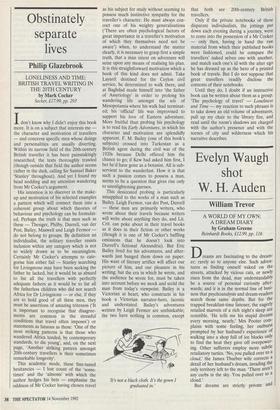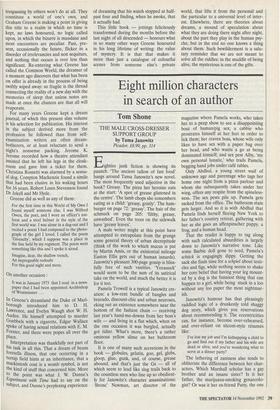Evelyn Waugh shot W. H. Auden
William Trevor
A WORLD OF MY OWN: A DREAM DIARY by Graham Greene Reinhardt Books, £12.99, pp. 116 Dreams are fascinating to the dream- er; rarely so to anyone else. Such adven- tures as finding oneself naked on the streets, attacked by vicious cats, or newly risen from the dead, may understandably be a source of personal curiosity after- wards; and it is in the normal line of busi- ness that psychoanalysts and dream-readers search those same depths. But for the trapped breakfast-time listener, the eagerly retailed marvels of a rich night's sleep are resistible. 'He tells me his stupid dreams every morning, nearly,' Mrs Pooter com- plains with some feeling, her outburst prompted by her husband's experience of walking into a shop full of ice blocks only to find the heat they gave off overpower- ing. Other sufferers employ more subtle retaliatory tactics. 'No, you pulled over to a cloud,' the James Thurber wife corrects a detail of her husband's dream, invading the only territory left to the man. 'There aren't any curbs in the sky. You pulled over to a cloud.' But dreams are strictly private and trespassing by others won't do at all. They constitute a world of one's own, and Graham Greene is making a point in giving this title to a realm in which no time is kept, no laws honoured, no logic called upon, in which the bizarre is mundane and most encounters are peculiar. Past, pre- sent, occasionally the future, flicker in a disorder of irrelevancies and non sequiturs, and nothing that occurs is ever less than significant. Re-entering what Greene has called the Common World, the dreamer of a moment ago discovers that what has been on offer is already in the process of being swiftly wiped away: so fragile is the thread connecting the reality of a new day with the memories of sleep that unless notes are made at once the chances are that all will evaporate.
For many years Greene kept a dream journal, of which this present slim volume is his selection for publication. His interest in the subject derived more from the profession he followed than from self- examination: writers are often dream- botherers, or at least reluctant to send a night's nonsense packing. Jerome K. Jerome recorded how a theatre attendant Insisted that he left his legs in the cloak- room and gave him a ticket for them. Christina Rossetti was alarmed by a sensu- al dog. Compton Mackenzie found a simile that had been elusive in his waking hours for 16 years. Robert Louis Stevenson found Dr Jekyll and Mr Hyde.
Greene did as well as any of them:
For the first time in this World of My Own I found myself someone else. I was Wilfred Owen, the poet, and I wore an officer's uni- form and a steel helmet in the style of the first world war. I was alone in a dug-out and I recited a poem I had composed to the photo- graph of the girl I loved. I called the poem `Givenchy', which I suppose was a place in the line held by my regiment. The poem went something like this and I spoke it aloud.
Imagine, dear, the shallow trench, An impregnable redoubt For this good night and more.
On another occasion :
It was in January 1973 that I read in a news- paper that I had been appointed Archbishop of Westminster .. .
In Greene's dreamland the Duke of Marl- borough introduced him to D. H. Lawrence, and Evelyn Waugh shot W. H. Auden. He himself attempted to murder Goebbels with a cigarette, Edgar Wallace spoke of having sexual relations with E. M. Forster, and there were popes all over the place.
Interpretation was thankfully not part of his task in all this. That a dream of beans foretells illness, that one occurring in a turnip field hints at an inheritance, that a mackintosh coat is a womb symbol, is not the kind of stuff that concerned him. More to the point was what J. W. Dunne's Experiment with Time had to say on the subject, and Dunne's perplexing experience of dreaming that his watch stopped at half- past four and finding, when he awoke, that it actually had.
This little book — jottings felicitously transformed during the months before the last night of all descended — honours what in so many other ways Greene honoured in his long lifetime of writing: the value of mystery. It is that that makes it more than just a catalogue of colourful scenes from someone else's private world, that lifts it from the personal and the particular to a universal level of inter- est. Elsewhere, there are theories about dreams, a mound of speculation about what they are doing there night after night, about the part they play in the human psy- che, but in the end no one knows a thing about them. Such bewilderment is a salu- tary reminder that we are not meant to solve all the riddles: in the muddle of being alive, the mysterious is one of the gifts.



































































 Previous page
Previous page